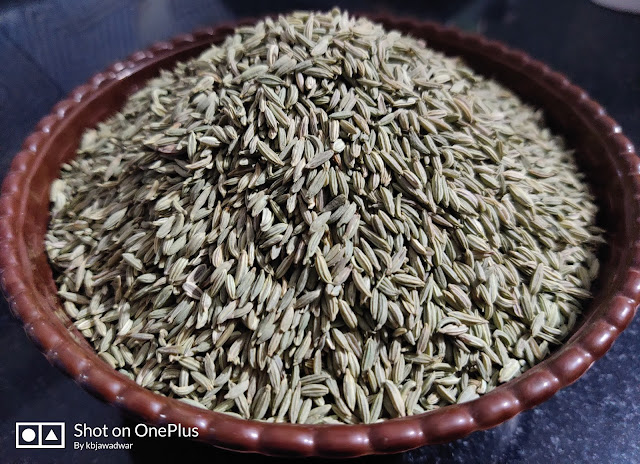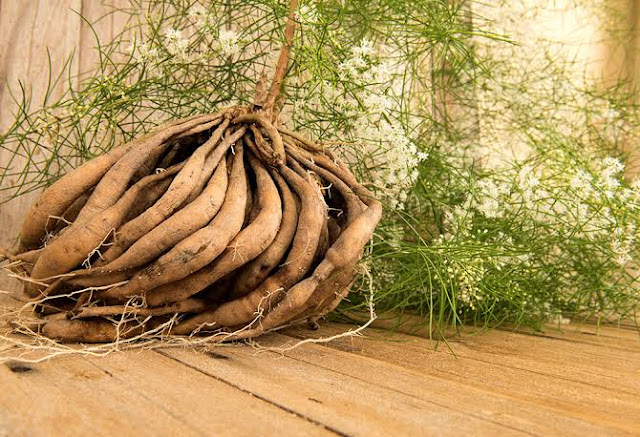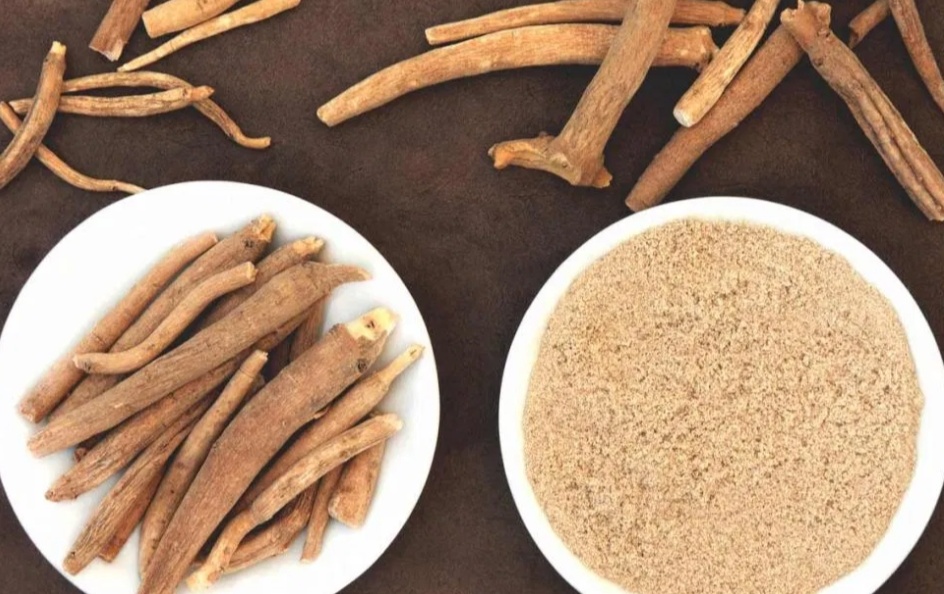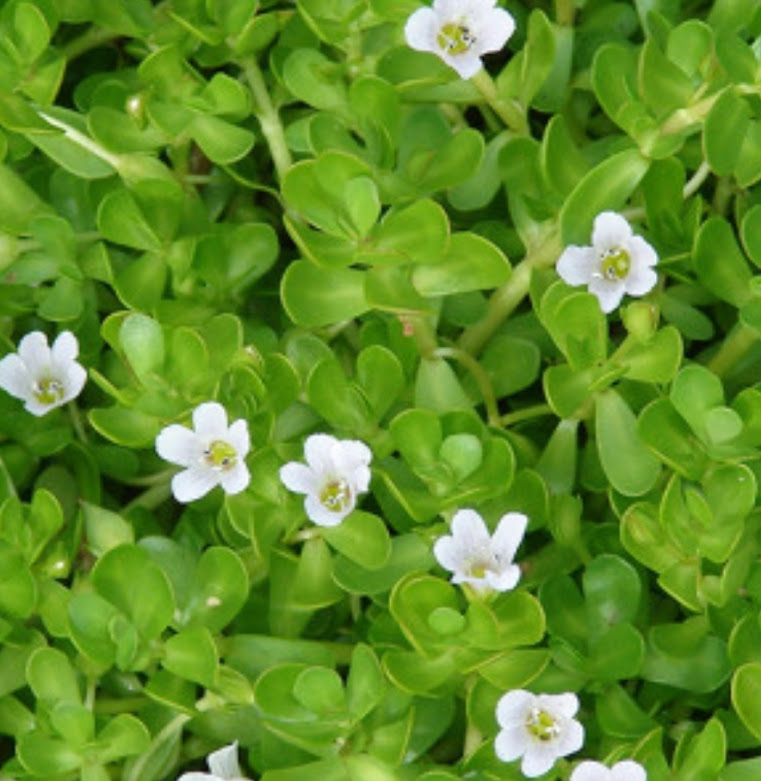Fennel seeds(sounf)
Fennel seeds(sounf)
Commonly eaten spice after meal is Fennel seeds. It is used in many recipes to inhance flavour and aroma of the dish. Fennel seeds (sounf) are sweet, bitter and woody in taste. It is a flowering plant species in the carrot family. It is a hardy, perennial herb with yellow flowers and feathery leaves. . It is an indigenous plant in the Mediterranean regions and also widely cultivated across the world near the coastal and riverbank regions. India is said to be the largest exporter of saunf. It shows antimicrobial, antiviral, anti-inflammatory, antimutagenic, antinociceptive, antipyretic, antispasmodic, antithrombotic, apoptotic, cardiovascular, chemomodulatory, antitumor, hepatoprotective, hypoglycemic, hypolipidemic, and memory enhancing property.
It has different names in different languages such as Marathi name(Badi Shep), Hindi name(Sounf), English name(Bitter fennel, common fennel, sweet fennel, wild fennel), Gujarati name(Variyali), Telugu name(Peddajilakurra, sopu), Panjabi name(sounf), Tamil name(Soumbu, Perun siragum, sohikire), Kannada name(Badisopu), Bengali name(Mauri), Malayalam Name(Perum jeerakam), Arabian name(Rajiyanaj), Farsi name(Rajiyan).
Click here for more information about Antioxidant
 |
Parts of plant used
Fruits, fruit oil and root
• Fennel is traditionally used for medicinal and culinary purposes. The entire plant is valuable in the medicinal industry;
- Fennel plant enlarged base is used as a vegetable.
- It's leaves are used for culinary purposes and its seeds as a spice and for essential oil extrac-tion.
- The flowers and leaves are also used to make yellow and brown dyes.
- Fennel pollen is the most potent form of fennel, but it is extremely.
Vitamins and minerals content
Nutrients found in dried fennel (USDA, USA).
| Composition | Quantity (Per 100 g) |
|---|---|
| Proximates | |
| Moisture | 90.21 g |
| Energy | 31 kcal |
| Protein | 1.24 g |
| Total lipid (fat) | 0.2 g |
| Carbohydrate | 7.3 g |
| Total dietary fiber | 3.1 g |
| Sugars | 3.93 g |
| Minerals | |
| Calcium, Ca | 49 mg |
| Iron, Fe | 0.73 mg |
| Magnesium, Mg | 17 mg |
| Phosphorus, P | 50 mg |
| Potassium, K | 414 mg |
| Sodium, Na | 52 mg |
| Zinc, Zn | 0.2 mg |
| Vitamins | |
| Vitamin C | 12 mg |
| Thiamin B-1 | 0.01 mg |
| Riboflavin B-2 | 0.032 mg |
| Niacin B-3 | 0.64 mg |
| Vitamin B-6 | 0.047 mg |
| Folate | 27 μg |
| Vitamin A | 48 μg |
| Vitamin E | 0.58 mg |
| Vitamin K | 62.8 μg |
| Lipids | |
| Fatty acids, total saturated | 0.09 g |
| Fatty acids, total monounsaturated | 0.068 g |
| Fatty acids, total polyunsaturated | 0.169 g |
| Essential amino acids | |
| Leucine | 0.63 g |
| Isoleucine | 0.73 g |
| Phenylalanine | 0.45 g |
| Tryptophane | 0.53 g |
| Nonessential amino acid | |
| Glycine | 0.55 g |
| Proline | 0.53 g |
• The essential oil extracted is mainly composed of (E)-anethole, (Z)-anethole and α-thujone including this it contains more than 87 volatile compounds.
• The aromatic property of fennel is because of the essence. There are more than 30 types of terpene compounds in the essential oil of fennel, the most important of them are 50 to 80% trans-anethole, 8% fenshon and limonene 5%
• Fruits contained 15–30 % fixed oil[ contains petroselinic acid (60 %), oleic acid (22 %), linoleic acid (14 %) and palmitic acid (4 %)] and up to 12 % volatile essential oil. The fruit also contained flavonoids, iodine, kaempferols, umbelliferone and stigmas-terol and ascorbic acid; traces of aluminium, barium, lithium, copper, manganese, silicon and titanium were also found.
• Caffeoylquinic and dicaffeoylquinic acids, flavonoids and rosmarinic acid among the ten main antioxidant phenolic compounds obtained from bitter fennel, using a simple high-performance liquid chromatography (HPLC) technique.
• Bitter fennel contains 50 % trans-anethole, 10–20 % fenchone (which contributes to the bitter flavour).
- The sweeter variety has 50–80 % anethole, little (5 %) or no fenchone, slightly higher levels of limonene with estragole, safrole and pinene.
Properties and benefits of fennel seeds
Properties
• Qualities – Laghu (light to digest), Snigdha (unctuous, oily)
• Taste – sweet, pungent, bitter
• Taste conversion after digestion – Madhura (sweet)
• Potency – SHEETA (Cold)
• Effect on Tridosha – Balances Vata, Pitta and Kapha
Click here for more information about Tridoshas
Benefits
• Durnama Kshayajit – useful in chronic respiratory conditions leading to emaciation. (as in tuberculosis).
• Kshataksheenahita – useful in people with injuries
• Balya – improves strength and immunity
• Pittasradoshajit – useful in bleeding disorders of Pitta origin
• Agnikrut – improves digestion strength
• Hrudya – good for heart, cardiac tonic
• Shukrapaha, Avrushya – It is not an aphrodisiac
• Yonishoolanut – useful in relieving pain arising from female reproductive system
Useful in
• Krumi – worm infestation
• Baddhavit – constipation
• Anila – Vata disorders
• Daha – burning sensation
• Aruchi – Anorexia, lack of interest in food
• Chardi – vomiting
• Kasa – cough, cold
Uses, benefits and application
1) Flavonoids content in fennel seeds helps to stimulate saliva, which helps to get rid of problem such as dry mouth.
2) Antibacterial property and aromatic flavour & smell helps combating bad breath. For this condition you should also take equal quantity of roasted fennel and fenugreek seeds, crush it and add salt according to taste. Eat ¼ – ½ teaspoon of this mixture after each meal.
3) The bulb, foliage and seeds of the fennel plant are potential sources of different nutrients and thus all are widely used both raw and cooked in side dishes, salads, pastas, vegetable preparations, sausages, etc.
4) It is used as pot herb because it is aromatic nature.
5) Roasted fennel is consumed as an organoleptic flavour correcter, or as an after meal digestive.
6) The whole seed, powder and oil are used as adjuncts for flavouring foods, as antioxidants and as a preservative in confectioneries and beverages.
7) Fennel can help expel wind from the alimen-tary canal, freeing the respiratory system, rendering a calming effect on coughs.
Intake : Eat some fennel seeds after meal or when you feel above situation.
8) In industry, fennel is used for flavouring and aromatizing, and as an organoleptic flavour corrector, in non-alcoholic beverages, baked goods, condi-ments, ice creams and liqueurs such as Anisette, and as a seasoning for prepared meats such as hot pepperoni and sweet Italian sausages.
9) Fennel oil mixed with honey can be taken for coughs and sore throat, and its(fennel seeds) tea is used as a gargle.
Click here for more information about Honey
10) Eating fennel seeds is very good remedy for nausea.
11) We offer fennel seeds after a meal. Eating saunf(fennel seeds) after meals is considered a healthy practice, primarily because of its ability to keep the digestive system healthy.
12) Fennel increased red and white blood cells probably due to the presence of polyphenols and antioxidant activity of fennel.
13) Fennel seeds help to improve eyesight, alleviate high eye pressure, dry eyes, tired, watery eyes and almost all eye related problems.
14) For cold take tea of Fennel seeds.
- Add 1/2 tea spoon of sounf and some amount of jaggery and heat it for some time.
15) For a fever, take 1 cup grape juice with ½ tsp fennel powder and ½ tsp cumin powder.
Click here for more information about Cumin seeds
16) For gas, make a mixture of equal parts of roasted fennel, cumin, & celery seeds. Chew ½ – 1 tsp of this mixture after meals and then swallow with a cup of warm water.
17) For cases of heat stroke, soak a handful of fennel seeds in water overnight. Strain the water and add a pinch of salt before drinking.
18) To promote bowel movements, chew 1 tsp of roasted fennel seeds after meals.
19) To purify your blood and better the digestion, consume a handful of raw fennel seeds in the morning and evening.
- According to Ayurveda, optimal digestion is fundamental to optimal health! If you don’t digest well, toxins build up and can lead to disease.
20) According to ayurveda, it actually does not reduce gastric secretions, but it reduces the Tikshna Gunna of pitta (sharpness of gastric acid which causes inflammation in the stomach). Due to this reason it is also very good for condition such as gastritis, indigestion, heartburn, acid reflux. For better results it is also taken with mulethi and amla.
21) In the respiratory system, fennel even reduces aggravated kapha that congests the lungs.
22) Immense amounts of phytonutrients present in fennel seeds aid in clearing the blocked sinuses and alleviates asthma symptoms. The expectorant properties help to treat respiratory ailments like bronchitis, cough and nasal congestion.
23) For fresh and toned skin texture take a teaspoon of fennel seeds and boil well, let it cool down and filter. Apply this mixture on the face using cotton balls several times in a day this can enhance the skin glow and keep your skin revitalized. It's high Antioxidant activity help out with this problem.
Note : 1) The leaves of bulb fennel have a flavour similar to herb fennel.
2) Florence fennel is a key ingredient in some Italian and German salads.
3) Shoots were also found to have high radical-scavenging activity and lipid peroxidation inhibition capacity.
4) 100 grams of fennel seeds provide almost 40 grams of dietary fiber. A majority of this fiber is metabolically inert insoluble fiber, which helps to increase the bulk of food by absorbing water throughout the digestive system and alleviating any constipation. The fibers, which are found in fennel seeds, remove toxins.
Refrence :
1) Journal of Medical Surgical Nursing Practice and Research
e-ISSN: 2582-1512, Volume 2, Issue 1
2)https://www.researchgate.net/publication/241714014_Morphological_and_Chemical_Evaluati n_of_Fennel_Foeniculum_vulgare_Mill_Populations_of_Different_Origin
3) Fennel and fennel seed
S. K. Malhotra, Indian Council of Agricultural Research
4) NCBI
5) Ayurvedacolleage.com
6) Journal of HerbMed Pharmacology
J HerbMed Pharmacol. 2015; 4(1): 1-9.
7) AYU (An international quarterly journal of research in Ayurveda)
8) PUBMED
9) Bhaprakash Nighantu
10) Wikipedia





found it informative! ��
ReplyDeleteVery informative and usefull
ReplyDeleteFantastic....
ReplyDeleteNice blog
ReplyDeleteMast
ReplyDeleteAJO_QQ poker
ReplyDeletekami dari agen poker terpercaya dan terbaik di tahun ini
Deposit dan Withdraw hanya 15.000 anda sudah dapat bermain
di sini kami menyediakan 9 permainan dalam 1 aplikasi
- play aduQ
- bandar poker
- play bandarQ
- capsa sunsun
- play domino
- play poker
- sakong
-bandar 66
-perang baccarat (new game )
Dapatkan Berbagai Bonus Menarik..!!
PROMO MENARIK
di sini tempat nya Player Vs Player ( 100% No Robot) Anda Menang berapapun Kami
Bayar tanpa Maksimal Withdraw dan Tidak ada batas maksimal
withdraw dalam 1 hari.Bisa bermain di Android dan IOS,Sistem pembagian Kartu
menggunakan teknologi yang mutakhir dengan sistem Random
Permanent (acak) |
Whatshapp : +855969190856
klinika-avershina
ReplyDelete.
Thanks for the information. I really like the way you express complex topics in lucid way. It really helps me understand it much better way. fennel seed powder
ReplyDelete